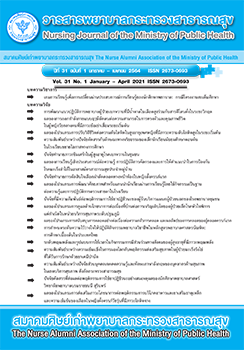Selected Factors Affecting Rational Antibiotic Use Behaviors of Nursing Students at Boromarajonani College of Nursing, Surin
Main Article Content
Abstract
The purposes of this research study were to investigate rational antibiotic use behavior, selection factors related to rational antibiotic use behavior and selection factors affecting the rational antibiotic use behavior of nursing students based on the theoretical framework of knowledge, attitude and behavior.14 The sample consisted of 328 nursing students in the academic year 2020 at Boromarajonani College of Nursing, Surin, which were obtained by stratified random sampling. The research instruments comprised 4 parts: 1) demographic data, 2) knowledge of antibiotic use, 3) attitude towards antibiotic use, and 4) rational antibiotic use behavior; with content validity between .67 and 1.00. The overall reliability of the questionnaires, using Cronbach’s alpha coefficient, was equal to .89. The data were analyzed using mean, standard deviation and multiple regression analysis. The results revealed as follows. Rational antibiotic use behavior of nursing students at Boromarajonani College of Nursing, Surin had the mean score of rational antibiotic use behavior for overall at a good level ( X =4.07, SD=.72).The relationship between each factor and rational antibiotic use behavior found that age, knowledge of antibiotic use and attitude towards antibiotic use had a positive correlation with statistical significance at .01 level, with correlation coefficient between .22 and .70. For selected factors affecting rational antibiotic use behaviors among nursing students, it was found that attitudes toward antibiotic use, age and knowledge of antibiotic use, can explain the variance of rational antibiotic use behavior at 51.90 percent with statistical significance at the level of .01 (R2=.52, p<.01) which creates a model of multiple regression equation by creating the equation in the form of the standardized coefficients as follow Ŷ=.61 (attitude towards antibiotic use)+.17 (knowledge of antibiotic use)+.10 (age).
Article Details
บทความและรายงานวิจัยในวารสารพยาบาลกระทรวงสาธารณสุข เป็นความคิดเห็นของ ผู้เขียน มิใช่ของคณะผู้จัดทำ และมิใช่ความรับผิดชอบของสมาคมศิษย์เก่าพยาบาลกระทรวงสาธารณสุข ซึ่งสามารถนำไปอ้างอิงได้
References
2. Roadmap to develop drug surveillance mechanisms. Critical Drug: Newsletter: Drug System Surveillance Information Center. (2014);6(21):3–6. (in Thai)
3. Centers for Disease Control and Prevention (CDC). Antibiotic/Antimicrobial Resistance. [Online], (cited on 2020,18 February) Available from: https://www.cdc.gov/drugresistance/.;2017.
4. National Antimicrobial Resistance Surveillance Center (NARSC). Antibiotic resistance situation in Thailand. [Online], (cited on 2020, 18 February). Available from: http://narst.dmsc.moph.go.th/news001.html.;2013.
5. World Health Organization (WHO). Antibiotic resistance. [Online], (cited on 2020, 18 February), Available from: http://www.who.int/mediacentre/factsheets/antibiotic-resistance/en;2016.
6. Tinothai, T. The development in using of antibiotics of people in phan district, chiangrai province. [mater thesis]. Chiangrai. Chiang Rai Rajabhat University. 2013. (in Thai)
7. Thochu. S, Muenpa. R. Outcomes of the program on rational drug use hospital in nonghong district, buriram. Thai journal of pharmacy practice. 2017: 9(2): 463-74. (in Thai).
8. Nadchar Y. Factors associated to antibiotic practice among public health students in a university, phathum thani. Valaya Alongkorn Review (Humanities and Social Science).2017;7(2):57-66. (in Thai)
9. Mongkonchaipak. J, Ruamsuk. J, Chaiprateap. A. The Study of Customer’s Knowledge and Behavior in Using Antibiotic at Community Drug Store in PathumThani Province. EAU Heritage Journal Science and Technology.2012;6(2):91–100. (in Thai)
10. Sukpaiboon. S, Apinundacha. C, Chaisiri, K. Antibiotics use behavior of patientsin Srangsoke, Ban Mo District. Saraburi Province. Proceedings of the 3rd national conference & research presentation;“Toward The Second Decade: Sustainability Knowledgement on Research Integration” 2016 June 17, Nakhonratchasrima College; Nakhonratchasrima, Thailand;2016;409-16. (in Thai)
11. Sirijoti K, Hongsranagon P, Havanond P, Pannoi W. Assessment of knowledge attitude and practices regarding antibiotic use in Trang province, Thailand. Journal of Health Research (2014);28(5):299-307. (in Thai)
12. Sornkrasetrin A, Thongma N, Rajataramya B. Factors predicting the rational antibiotic use among nursing students. The Journal of Boromarajonani College of Nursing, Nakhonratchasima, 2019; 25(1):43-59. (in Thai)
13. Seatung N, Kitreerawutiwong N. Factors influencing antibiotics use behavior in sore throat, clean wound, and acute diarrhea among village health volunteers. Journal of The Royal Thai Army Nurses.2018;19 (Suppl):166-74. (in Thai)
14. Schwartz, ME. Nutritional Knowledge, Attitude and Practice of High School Graduate. Journal of American Dict. Association. 1975;66(May):28-37.
15. Juangjan, V. Knowledge, attitude and practice in the use of antibiotics. In diseases of the upper respiratory tract Diarrhea and bleeding ulcers among working-age people at Sub-District Health Promotion Hospital, Kantang District, Trang Province. [Online], (cited on 2020, 1 February), Available from:http://cdea. scphtrang.ac.th/node/81.;2017.
16. Aisoonphisarnkul. P, Krisanapun. C. A survey of Medication Knowledge and Self–medication Practices among First–Year at Srinakharinwirot University. Isan Journal of Pharmaceutical Sciences.2014;10(1):42–55. (in Thai)
17. Aunruean. W, Saensom. D. Behavior of KKU students on antibiotics use in sore throat, clean wound and acute diarrhea. KKU Institutional Research Journal.(2015);3(3):221-32. (in Thai)
18. Tachavijitjaru C, Srisupornkornkul A, Changtej S. Selected factors related with the health literacy of village health volunteer. Journal of The Royal Thai Army Nurses. 2018;19:S320-S332. (in Thai).
19. Pereko DD,Lubbe MS, Essack SY.Public knowledge,attitudes and behaviour towards antibiotic usage in Windhoek, Namibia. Southern African Journal of Infectious Diseases,(2015);30(4):134-137.DOI:10.1080/23120053.2015.1107290
20. Demore B, Mangin L, Tebano G, Pulcini C, Thilly N. Public knowledge and behaviours concerning antibiotic use and resistance in France: a cross-sectional survey. Infection Control and Hospital Epidemiology. 2017;45(4):513-20.
21. Bunmusik. S, Chantra, R. Heeaksorn. C. Knowledge attitude and behaviors in rational antibiotics use of nursing students southern college of nursing and public health network. Journal of Health Research and Innovation. (2019);2(1):25-36. (in Thai)

